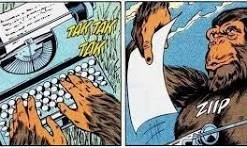What Comes Next
At this point, it looks like this book will consist of five chapters. The first, "Watchers and Watchmen," continues and fleshes out some of the ideas elaborated in the previous post. Why are Marvel superhero comics so preoccupied with watching, as most obviously exemplified in the figure of Uatu the Watcher? A genre so committed to the taking up the fight against evil nonetheless repeatedly pauses to consider the ethics of intervention, during a decade characterized by America's own foolhardy international interventionism and pop culture responses to the questions of transcultural responsibility (most notably in the original Star Trek). The chapter than jumps ahead to Watchmen, Alan Moore and Dave Gibbons' monumental deconstruction of the superhero genre, which also turns out to be an extended meditation on the advisability of standing back or getting involved.
Chapter Two, "Meddlers and Editors," turns to the comics that appear to advocate a more forceful activism, whether through figures such as the Monitor, the "relevant" comics of the 1970s (Green Lantern/Green Arrow), ham-handed attempts at addressing contemporary tragedies such as the unbelievably awful 1980s DC and Marvel one-shots about the Ethiopian famine, and stories about superheroes taking over the world for its own good (such as Squadron Supreme).
We’re all about good writing and quality control here at “Reading the Superhero”
Chapter Three ("The Law vs Justice") examines the ramifications of vigilantism over many years of comics about Daredevil, a superhero whose day job is working as an attorney, the fascist ramifications of The Dark Knight Returns, and problematic, murderous antiheroes such as the Punisher and the Foolkiller.
Chapter Four returns to the cosmic scale of Monitors and Watchers. "Crisis and Event, or, Punching Reality in the Face" is an extended analysis of the reality changing crossover event, a regular feature of modern DC that has occasionally been used by DC and repeatedly satirized and deconstructed in a number of independent comics. The Event raises the stakes of the conflict considerably, but also inevitably makes the nature of comic book reality the most important part of the story. And, yes, I end up bringing in Alain Badiou.
Chapter Five will either be about the "Revolving Door of Death" (the ubiquitous trope of death and resurrection) or my attempt at a Grand Theory of the Corporate Comics Chronotope. Or maybe those will be Chapters Five and Six. All my plans are subject to the whims of Monitors, Anti-Monitors, and my own internal Editor.
Next: Chapter One: Watchers and Watchmen
